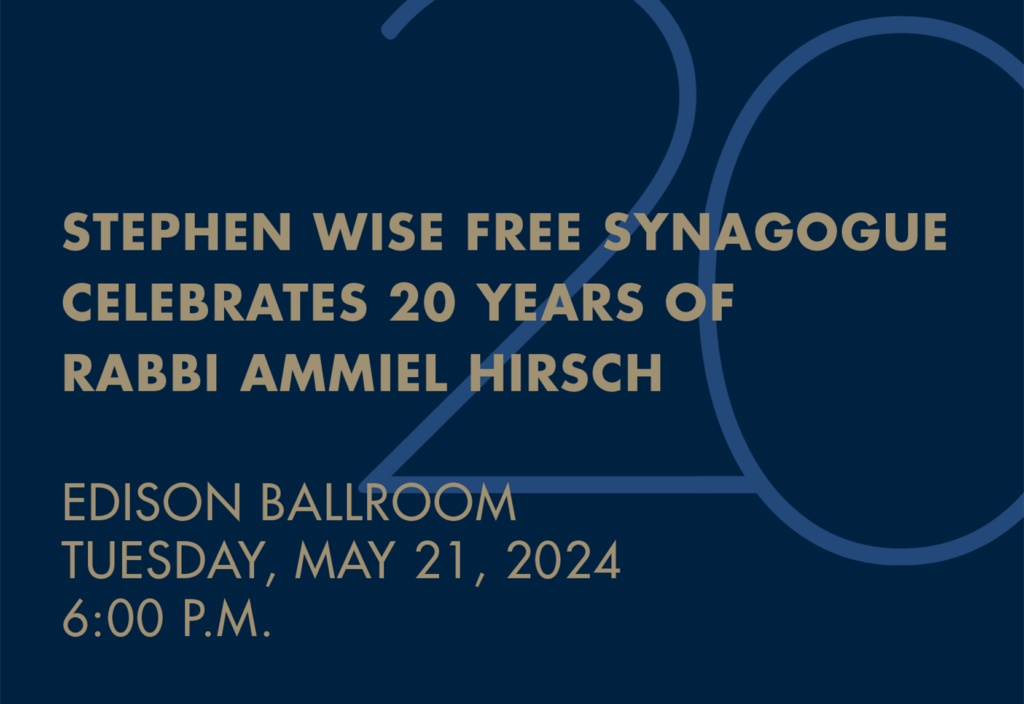On Yom Kippur, Rabbi Ammi Hirsch shared the range of emotions experienced by Jews since October 7, 2023, including anger, love, sorrow, mutual responsibility and determination to recover. Addressing young adults directly, he urged them to stay committed to Israel and the Jewish people: “I love your generation. You are our future. Know that we tried to instill in you a sense of justice, virtue, honor and decency for all people, and if this leads you to be critics of Israel, so be it. At the same time, we wanted you to be Zionists. Direct your eyes and heart towards our people. If they rejoice, rejoice with them. If they suffer, suffer with them. Mourn with them. Support them. Help them.”
“What is the most important verse in the Bible?” asks Rabbi Ammi Hirsch on Erev Yom Kippur. “You have all these grand ethical principles: monotheism, equality, justice, humanity, mercy, loving-kindness, freedom — and one of our Sages pulls out an obscure verse that seemingly means nothing…”
“Many of us wonder if it’s possible to feel God’s presence,” says Rabbi Samantha Natov, but divinity is everywhere — all around us. “Over these days of repentance and return, may we reconnect with our capacity to bring God’s light into the world through acts of forgiveness, tzedakah, lovingkindness, and compassion.”
“Glass is not fragile in all ways just because it is fragile in one way,” says Rabbi Rena Rifkin, reflecting on her recent visit to the Corning Museum of Glass. And like glass, the Jewish community has shown tremendous resilience throughout history. “We have survived not only because of our strength, but because we have learned how to adapt to best fit the needs of our people,” she says. This new year, may we “truly take notice of our own people and all that we can offer to one another and the world.”
“For Jews, our deepest anxieties for the safety of our people — the product of centuries of repressed traumas — have reawakened and our confidence in the West’s ability to withstand the test of civilization has been shaken,” says Rabbi Ammi Hirsch on Rosh Hashanah, warning that what was unleashed against Israel on October 7th “threatens the West as much as it does the Middle East…”
✡️ On the seriousness and resurgence of antisemitism:
“One of the saddest developments since October 7 is the shock experienced by American Jews, who, for the first time in their lives, are encountering pervasive antisemitism…”
🇮🇱 On today’s manifestations of anti-Zionism:
“…the intent of anti-Zionism is to generate intense hostility to Judaism and Jews themselves… How easily do anti-Israel passions lead to violence against Jews and Jewish institutions…”
“If you understand the history of classic antisemitism, the connection to today’s anti-Zionism stares you in the face. The Jewish state has become the Jew of the world, humanity’s ultimate villains, and accused of our era’s worst transgressions..”
🗽 On post-October 7 society and the test of Western civilization:
“For years now, some of us have been warning of a deteriorating commitment to liberal values, camouflaged by a torrent of high-sounding words like ‘progress, civil and human rights, anti-racism, and anti-colonialism.’ Ideologies that divide people by the color of their skin rather than the content of their character; philosophies that reduce all human conflict to oppressor and oppressed, subjugation and freedom fighting, racists and anti-racists — are not liberal values… These are illiberal and dangerous ideas that threaten the future of our country and Western civilization.”
💪 What can we do?
“Recognize the urgency of the times. We must win this battle of ideas and reassert basic norms of Western liberal morality. Do not be in denial. Do not be complacent. Fight back… fight back hard.”
Rabbi Ammi Hirsch opens the Rosh Hashanah evening services with a message of resilience: “There is a stone slab in the Egyptian Museum in Cairo. It was carved around the year 1,200 BCE and stands 10 feet tall. Its purpose was to praise the military victories of the Pharaoh Merneptah. What did the king say about us? What were the first words ever written about the Jewish people? At the bottom of the slab recording the deeds of the ‘lord of strength, whose name is given to eternity,’ as Merneptah described himself, he writes: ‘Israel is laid waste, its seed is destroyed.’ Stay strong and keep the faith — we ain’t goin’ nowhere!”


